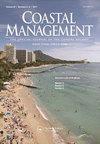利用开放数据科学原则改进IEA方法
IF 1.9
4区 环境科学与生态学
Q4 ENVIRONMENTAL SCIENCES
引用次数: 6
摘要
综合生态系统评估(IEAs)通过编制和使用指标、风险评估和其他分析来满足不同空间尺度上的区域政策需求。虽然实施内部环境评估的方法是具体情况的,但数据采集、管理、处理、分析和通信方面的挑战是普遍存在的。通过拥抱开放科学,使科学数据、方法和产品可以公开获取,以及不断扩大的促进开放科学的工具,国际能源署的从业者将更好地应对这些挑战。在这里,我们提供了美国正在进行的IEAs开放科学实践状态的快照。我们表明,开放科学提高了IEA框架内科学工作流程的灵活性、可重复性和效率。虽然开发开放科学工作流程所需的初始时间投资可能看起来令人望而生畏,但我们表明,IEA产品的高效和透明开发所提供的后续回报是值得的。通过改进IEAs的实施,开放科学工具和原则有可能在全球范围内进一步推进基于生态系统的管理(EBM)。本文章由计算机程序翻译,如有差异,请以英文原文为准。
Improving the IEA Approach Using Principles of Open Data Science
Abstract Integrated ecosystem assessments (IEAs) compile and use indicators, risk assessments, and other analyses to address regional policy needs at varying spatial scales. Although approaches to implementing IEAs are context-specific, challenges in data acquisition, management, processing, analysis, and communication are universal. By embracing open science, in which scientific data, methods, and products are made publicly accessible, along with the ever-expanding tools facilitating open science, IEA practitioners will be better equipped to address these challenges. Here, we provide a snapshot of the state of open science practices in IEAs on-going across the United States. We show that open science has improved the flexibility, reproducibility, and efficiency of the scientific workflows within the IEA framework. Although the initial time investment necessary for developing open science workflows may appear daunting, we show that the subsequent returns provided by the efficient and transparent development of IEA products are worth the effort. By improving the implementation of IEAs, open science tools and principals have the potential to further Ecosystem Based Management (EBM) worldwide.
求助全文
通过发布文献求助,成功后即可免费获取论文全文。
去求助
来源期刊

Coastal Management
环境科学-环境科学
CiteScore
6.00
自引率
0.00%
发文量
24
审稿时长
>36 weeks
期刊介绍:
Coastal Management is an international peer-reviewed, applied research journal dedicated to exploring the technical, applied ecological, legal, political, social, and policy issues relating to the use of coastal and ocean resources and environments on a global scale. The journal presents timely information on management tools and techniques as well as recent findings from research and analysis that bear directly on management and policy. Findings must be grounded in the current peer reviewed literature and relevant studies. Articles must contain a clear and relevant management component. Preference is given to studies of interest to an international readership, but case studies are accepted if conclusions are derived from acceptable evaluative methods, reference to comparable cases, and related to peer reviewed studies.
 求助内容:
求助内容: 应助结果提醒方式:
应助结果提醒方式:


